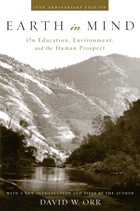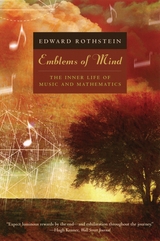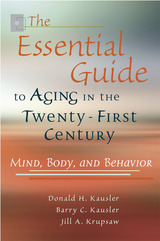5 start with E start with E

In Earth in Mind, noted environmental educator David W. Orr focuses not on problems in education, but on the problem of education. Much of what has gone wrong with the world, he argues, is the result of inadequate and misdirected education that:
- alienates us from life in the name of human domination
- causes students to worry about how to make a living before they know who they are
- overemphasizes success and careers
- separates feeling from intellect and the practical from the theoretical
- deadens the sense of wonder for the created world
The author begins by establishing the grounds for a debate about education and knowledge. He describes the problems of education from an ecological perspective, and challenges the "terrible simplifiers" who wish to substitute numbers for values. He follows with a presentation of principles for re-creating education in the broadest way possible, discussing topics such as biophilia, the disciplinary structure of knowledge, the architecture of educational buildings, and the idea of ecological intelligence. Orr concludes by presenting concrete proposals for reorganizing the curriculum to draw out our affinity for life.

Jacques Barzun called this book “splendid.” Martin Gardner said it was “beautifully written, marvelous and entertaining.” It will provoke all serious readers to think in new ways about the grand patterns in art and life.
“Lovely, wistful. . . . Rothstein is a wonderful guide to the architecture of musical space, its tensions and relations, its resonances and proportions. . . . His account of what is going on in the music is unfailingly felicitous.”—New Yorker
“Provocative and exciting. . . . Rothstein writes this book as a foreign correspondent, sending dispatches from a remote and mysterious locale as a guide for the intellectually adventurous. The remarkable fact about his work is not that it is profound, as much of the writing is, but that it is so accessible.”—Christian Science Monitor

The most important work by one of America's greatest twentieth-century philosophers, Empiricism and the Philosophy of Mind is both the epitome of Wilfrid Sellars' entire philosophical system and a key document in the history of philosophy. First published in essay form in 1956, it helped bring about a sea change in analytic philosophy. It broke the link, which had bound Russell and Ayer to Locke and Hume--the doctrine of "knowledge by acquaintance." Sellars' attack on the Myth of the Given in Empiricism and the Philosophy of Mind was a decisive move in turning analytic philosophy away from the foundationalist motives of the logical empiricists and raised doubts about the very idea of "epistemology."
With an introduction by Richard Rorty to situate the work within the history of recent philosophy, and with a study guide by Robert Brandom, this publication of Empiricism and the Philosophy of Mind makes a difficult but indisputably significant figure in the development of analytic philosophy clear and comprehensible to anyone who would understand that philosophy or its history.

For more than a decade, The Graying of America has helped thousands of middle-aged and senior citizens find their way through the thickets and thorns of growing old. Now greatly revised and expanded to include information gleaned from studies of the past five years, this third edition has been retitled to stress its ongoing purpose: conveying a wealth of commonsense information for general readers in nontechnical language.
The book is a storehouse of concise, useful information on the effects of aging on health, the mind, and behavior. Its 588 entries (including 172 new and 150 substantially revised) cover a broad spectrum of topics—from adjusting to retirement to grandparenting, sleep disorders to Alzheimer’s disease. All are directed to the average reader; all stress successful aging and how to accomplish it.
New entries cover such topics as the incidence and causes of frailty, the cognitive benefits of diversified activity, and findings of the Women’s Health Initiative. There is new information on matters like the effects of untreated hearing impairment on spouses and the impact of insufficient exposure to sunlight on sleep, plus new insight into what to look for in searching for a quality nursing home for a loved one.
Also included are results of recent studies on interventions that help to reduce age-related declines in mental and physical health, among them revelations that reports on age-related declines in memory have been skewed by testing errors. And with memory a concern for seniors fearful of declining mental agility, the book tells how to bypass memory problems—such as how to remember where you parked your car—and how physical exercise and challenging mental games can help reduce the risk of dementia. Other “how to avoid” entries offer ways to protect against eye fatigue in computer use, hip fractures when falling, and back injuries while lifting heavy objects.
No other book is so specifically geared to the challenges of how to reduce or even eliminate many of the problems associated with growing old. Aging in the Twenty-First Century can help seniors come to grips with their own aging process—and help younger adults understand what is happening to older family members.

We aren't very strong, nor very fast, we have insufficient body hair to keep us warm and dry, and we will never eat bananas with our feet. But like our chimpanzee cousins, we, the naked apes, have evolved to flourish in our surroundings--a cultural environment largely of our own creation. For the human race, the critical evolution of the past million years has been the evolution of our minds.
Yet psychology, the very science that purports to understand us, has long been deeply ambivalent about Darwin's unsettling discoveries. In an accessible, level-headed overview, Henry Plotkin describes the new rapprochement called 'evolutionary psychology.' He examines how such a powerful theory as Darwinism could have been disregarded by much academic psychology and shows why the relationship between the two must be readdressed. The theory and data of evolutionary biology and animal behavior can illuminate many of our most basic mental processes and activities: language learning, perception, social understanding, and most controversially, culture and the sharing of knowledge and beliefs.
Ranging from the nature-nurture question, which has bedeviled philosophers and scientists for thousands of years, to recent debates about the mind's structure, Evolution in Mind vividly demonstrates how an evolutionary perspective helps us understand what we are, and how we got that way.
READERS
Browse our collection.
PUBLISHERS
See BiblioVault's publisher services.
STUDENT SERVICES
Files for college accessibility offices.
UChicago Accessibility Resources
home | accessibility | search | about | contact us
BiblioVault ® 2001 - 2024
The University of Chicago Press









